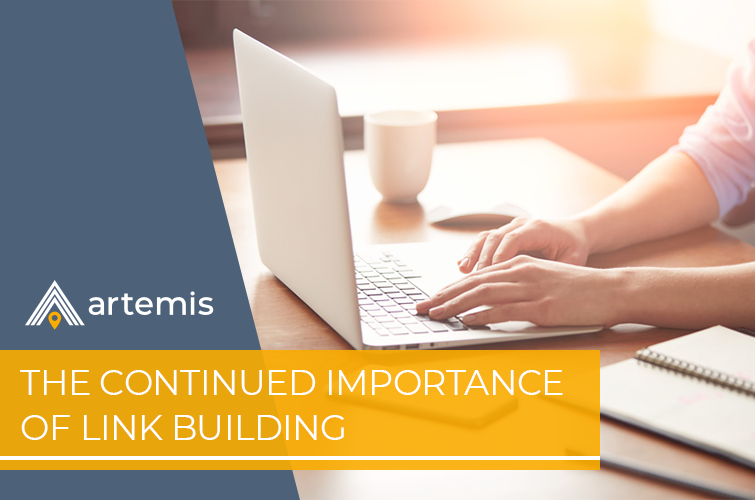The Continued Importance of Link Building

If you want your site to rank well on Google, you need a strong backlink profile. Getting natural links on the basis of the quality of your product and services is an important part of this – but you can make your SEO strategy even more effective with a link-building campaign.
Link building isn’t easy; to build links in 2021 you need a combination of carefully considered research and planning, note-perfect content creation, and the ability to build rapport with a wide network of high-quality sites. But the fantastic results can make it worth it. Here we take a look at how link building works, and why it is still hugely valuable to your site.
Why is link building important?
The main reason that link building is important in 2021 is simple: it works. Inbound links remain one of Google’s most important ranking factors. Receiving a link from a strong site is considered to be an endorsement of your site.
Getting a number of strong links over time builds up a fantastic backlink profile, and this is crucial in improving your rankings for specific terms.
But getting high-quality links for your site is easier said than done – it takes a great deal of work at all stages of the process. So, let’s look at some of the factors involved in link building.
Creating the highest quality content
The practice is known by the name ‘link building’, but today getting the top-quality links needed to boost a website’s search engine rankings is only possible by earning those links with exceptionally high-quality content.
Creating content for link building takes a huge amount of planning and research – not to mention the time needed to craft the piece and get it ready for publication. But it is important to remember that this is only one step in the process. Strong link building takes the work of skilled writers, but a huge part of it comes down to the outreach process.
Building a connection
Outreach involves the process of finding and contacting sites to establish whether they are interested in linking back to your site by posting a blog or article. The most basic version of link building involves writing a great blog or article that links back to your site and then offering that article around to a number of sites to see if any are interested in posting it.
However, this method rarely achieves the results you are looking for. Increasingly, outreach and content creation are intrinsically linked. Before any content is written, it is wise to build a connection with other sites and then establish the kind of content they are looking for. This helps to ensure that you can then create content that will definitely be published by a specific, powerful site.
Avoiding bad practice
Perhaps unsurprisingly, there is a lot of bad practice in terms of link building – and this can sometimes give the concept a bad name. We have already talked about the mistake of not targeting specific sites for link building, but there are actually a number of far more fundamental issues that can go wrong.
In the past, it was common to see link builders stuffing articles with a large number of links or, worse, publishing articles in great numbers on very low-quality sites. Google and other search engines are now far more sophisticated, and can easily understand when a site is receiving a high number of bogus, low-quality links.
In the best-case scenario, these links will simply be ignored by the search engine’s algorithm resulting in significant wasted effort. But is also possible that sites with a high number of poor-quality links will be penalised and negatively affected in their search rankings. This is why it is always wise to let link-building professionals and SEO specialists manage this work for you.
Choosing the right sites
We have established that publishing on the wrong sites can be a real negative from a link-building perspective; so, how do we go about picking the right sites? Firstly, it should be pointed out that low-quality sites are often obvious: excessive advertising, low-value content, and poor web design are all alarm bells when assessing a site for suitability. That’s before you start looking at the numbers.
Domain authority remains a very important metric in establishing whether a site is valuable to get a link from. Additionally, it is worth looking at secondary metrics – for example, do they have active social media profiles that receive regular interaction?
It is also important to think about relevance. If your site sells comic books, and the one linking to you focuses on reviews of washing machines, it’s not hard for Google to notice the relevance disconnect.
Selecting relevant directories
Another important aspect of link building comes in the form of directories. It was once the case that businesses would have themselves included on any directory site – a site that functions as a directory of businesses and sites to help customers find the services and products that they need. Unfortunately, as with many SEO tactics, this was overused and Google began to recognise and place less importance on low-quality directory links.
Today, directory links still have a place, but only when directories are carefully selected and chosen for their strength and relevance. Working to a specific criterion, it is possible to get genuinely high-quality links simply through submissions to directories.
At Artemis, our content and digital PR team specialise in high-quality link building – getting powerful links to help your site rank higher on Google. If you are interested in learning more, please get in touch with our experienced team today.

